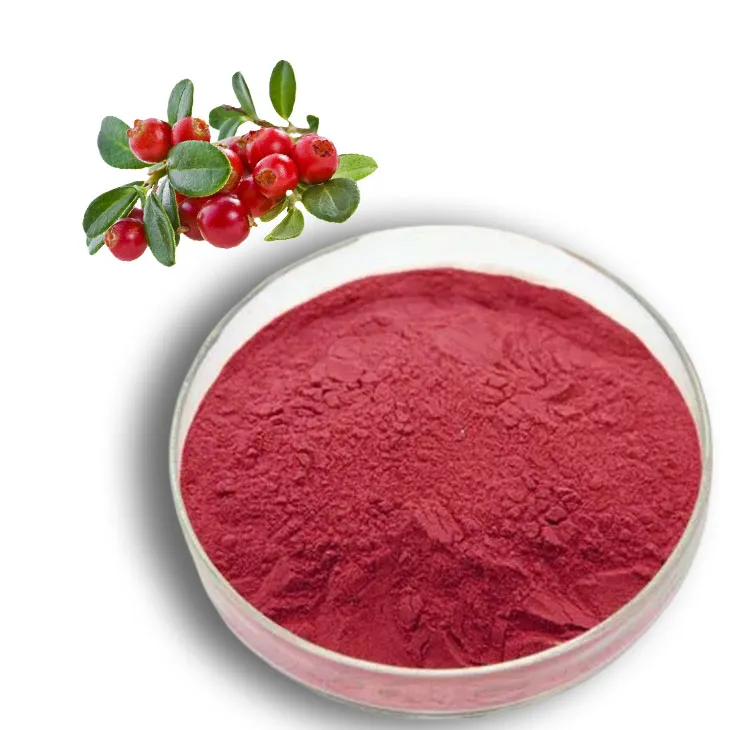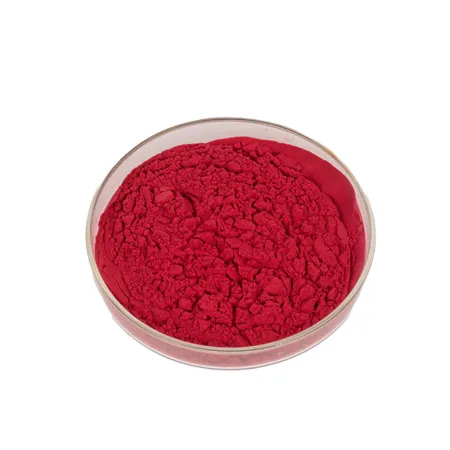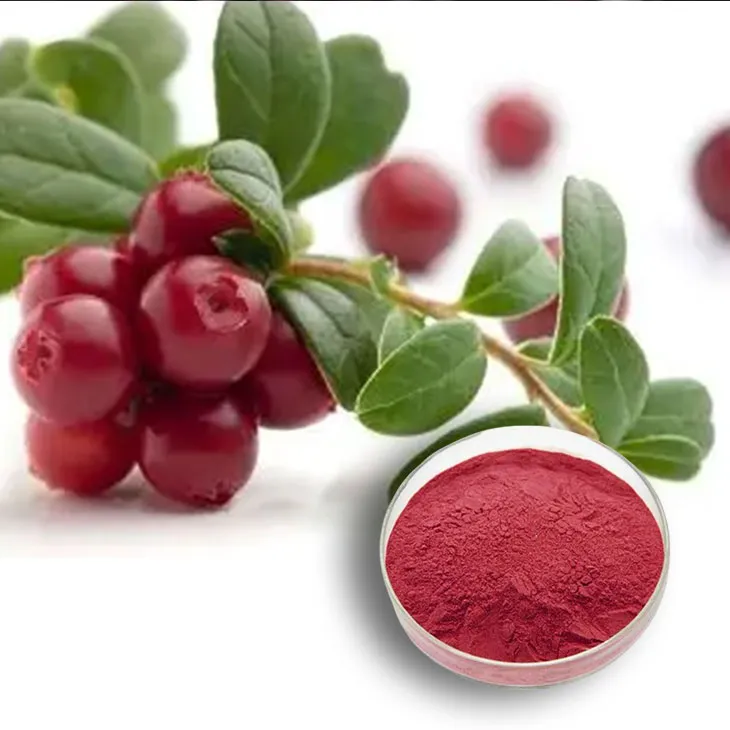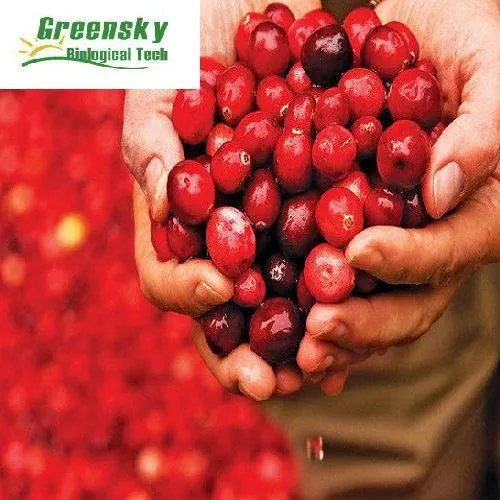- 0086-571-85302990
- sales@greenskybio.com
Cranberry extract can reduce high blood pressure.
2024-11-11

Introduction
High blood pressure, or hypertension, is a major health concern worldwide. It is a significant risk factor for various cardiovascular diseases, including heart attacks and strokes. In the search for natural remedies to combat hypertension, Cranberry Extract has emerged as a potential candidate. This article aims to explore the scientific basis behind the claim that Cranberry Extract can reduce high blood pressure, looking at its mechanisms, research findings, and the possible benefits for those with hypertension.

What is Cranberry Extract?
Cranberry extract is derived from the cranberry fruit, which is native to North America. The cranberry is well - known for its high content of various bioactive compounds, such as phenolic acids, flavonols, and proanthocyanidins. Proanthocyanidins are of particular interest in relation to blood pressure regulation. These compounds are polymers of flavan - 3 - ol units and are responsible for many of the health - promoting properties associated with cranberries.

Mechanisms of Action
Antioxidant Activity
One of the key mechanisms through which cranberry extract may influence blood pressure is its antioxidant activity. Oxidative stress is known to play a role in the development of hypertension. Free radicals can damage blood vessels, leading to endothelial dysfunction. Cranberry extract, rich in antioxidants, can help neutralize these free radicals, protecting the endothelial cells lining the blood vessels. This, in turn, may improve blood vessel function and contribute to a reduction in blood pressure.
Effect on Nitric Oxide
Nitric oxide (NO) is a crucial molecule for blood vessel dilation. Endothelial cells produce NO, which relaxes the smooth muscle in the blood vessel walls, allowing them to widen. Some studies suggest that cranberry extract may enhance the production or availability of nitric oxide. By promoting the release of NO, cranberry extract can lead to vasodilation, reducing the resistance in the blood vessels and consequently lowering blood pressure.
Anti - inflammatory Effects
Chronic inflammation is another factor associated with hypertension. Cranberry extract has been shown to possess anti - inflammatory properties. It can inhibit the production of inflammatory cytokines and mediators. By reducing inflammation in the blood vessels and the body as a whole, cranberry extract may help to counteract the processes that lead to increased blood pressure.

Research Findings
Animal Studies
Several animal studies have provided evidence for the blood - pressure - lowering effects of cranberry extract. For example, in a study on hypertensive rats, those fed with cranberry extract showed a significant decrease in blood pressure compared to the control group. The researchers attributed this to the combined antioxidant, anti - inflammatory, and nitric - oxide - enhancing effects of the extract. Another animal study demonstrated that cranberry extract could improve the function of the renin - angiotensin - aldosterone system (RAAS), which is an important regulator of blood pressure. By modulating the RAAS, cranberry extract may help to keep blood pressure in check.
Human Studies
Although the evidence from human studies is still relatively limited, some promising results have been reported. In a small - scale clinical trial, participants with mild hypertension who consumed cranberry extract for a certain period showed a slight but noticeable reduction in blood pressure. However, larger and more comprehensive human studies are needed to confirm these initial findings and to determine the optimal dosage and duration of cranberry extract supplementation for blood pressure management.

Benefits for Those with High Blood Pressure
For individuals with high blood pressure, cranberry extract may offer several potential benefits. Firstly, as a natural alternative to pharmaceutical drugs, it may be more appealing to those who prefer a holistic approach to health or who experience side effects from blood - pressure - lowering medications. Secondly, cranberry extract may have additional health benefits beyond blood pressure control. For example, it has been associated with urinary tract health due to its ability to prevent bacterial adhesion in the urinary tract. This means that by consuming cranberry extract for blood pressure, individuals may also gain protection against urinary tract infections.
How to Incorporate Cranberry Extract
Food Sources
One way to obtain cranberry extract is through consuming cranberries directly. Fresh cranberries, cranberry juice, and dried cranberries are all available sources. However, it should be noted that cranberry juice often contains added sugars, which may not be beneficial for those with hypertension or other health conditions. Therefore, it is advisable to choose unsweetened cranberry juice or consume cranberries in their natural form as much as possible.
Supplements
Cranberry extract supplements are also widely available in the market. When choosing a supplement, it is important to look for a high - quality product from a reputable manufacturer. Check the label for the concentration of active ingredients, such as proanthocyanidins. It is also recommended to consult a healthcare provider before starting any new supplement, especially if you are taking medications for high blood pressure or other health problems, as there may be potential interactions.
Conclusion
In conclusion, cranberry extract shows potential in reducing high blood pressure through multiple mechanisms, including antioxidant activity, modulation of nitric oxide, and anti - inflammatory effects. While animal studies have provided strong evidence and human studies have shown some promising results, more research is needed to fully understand its effectiveness and safety in humans. For those with high blood pressure, cranberry extract may be a valuable addition to a comprehensive approach to blood pressure management, but it should not replace conventional medical treatment without medical advice. As the scientific knowledge in this area continues to expand, cranberry extract may prove to be an important natural tool in the fight against hypertension.
FAQ:
1. How does cranberry extract reduce high blood pressure?
Cranberry extract may reduce high blood pressure through several mechanisms. It might have antioxidant properties that help reduce oxidative stress in blood vessels, which can improve their function. Also, it could potentially affect the renin - angiotensin - aldosterone system (RAAS), which plays a crucial role in blood pressure regulation. However, more research is needed to fully understand these mechanisms.
2. What are the research findings regarding cranberry extract and high blood pressure?
Some studies have shown that cranberry extract can lead to a reduction in blood pressure. For example, in certain animal models, regular intake of cranberry extract has been associated with lower systolic and diastolic blood pressure values. In human studies as well, there have been indications of a positive impact on blood pressure, but the results are not always consistent. This could be due to differences in study designs, dosages used, and the characteristics of the participants.
3. Is it safe to use cranberry extract for high blood pressure?
Generally, cranberry extract is considered safe for most people when used in moderation. However, some individuals may experience side effects such as stomach upset or allergic reactions. Also, cranberry extract may interact with certain medications, especially those used to treat high blood pressure. So, it is important to consult a healthcare provider before starting to use cranberry extract for high blood pressure management.
4. How much cranberry extract should be taken to potentially lower high blood pressure?
There is no standard recommended dose for using cranberry extract to lower high blood pressure yet. Different studies have used various dosages, and the optimal amount may depend on factors such as an individual's overall health, body weight, and the severity of their high blood pressure. It is best to follow the advice of a healthcare professional when determining the appropriate dosage.
5. Can cranberry extract replace traditional high - blood - pressure medications?
No, cranberry extract cannot replace traditional high - blood - pressure medications at present. While it may have some beneficial effects on blood pressure, it has not been proven to be as effective as established medications. However, it could potentially be used as a complementary approach in addition to standard medical treatment, under the supervision of a healthcare provider.
Related literature
- The Effects of Cranberry on Cardiovascular Health: A Review"
- "Cranberry Extract and Hypertension: Current Research and Future Perspectives"
- "Antioxidant Properties of Cranberry Extract in Relation to Blood Pressure Regulation"
- ▶ Hesperidin
- ▶ citrus bioflavonoids
- ▶ plant extract
- ▶ lycopene
- ▶ Diosmin
- ▶ Grape seed extract
- ▶ Sea buckthorn Juice Powder
- ▶ Beetroot powder
- ▶ Hops Extract
- ▶ Artichoke Extract
- ▶ Reishi mushroom extract
- ▶ Astaxanthin
- ▶ Green Tea Extract
- ▶ Curcumin Extract
- ▶ Horse Chestnut Extract
- ▶ Other Problems
- ▶ Boswellia Serrata Extract
- ▶ Resveratrol Extract
- ▶ Marigold Extract
- ▶ Grape Leaf Extract
- ▶ blog3
- ▶ blog4
- ▶ blog5
-
Organic Tongkat Ali extract powder factory.
2024-11-11
-
How to make powder with ashwagandha extract.
2024-11-11
-
Rosehip extract manufacturers from China.
2024-11-11
-
The best cat's claw extract in nature.
2024-11-11
-
Chinese Dandelion Leaf Extract Suppliers.
2024-11-11
-
Acerola Juice Powder
2024-11-11
-
Bilberry Extract
2024-11-11
-
Coconut Water Powder
2024-11-11
-
Hericium erinaceus extract powder
2024-11-11
-
Nutmeg Extract
2024-11-11
-
Citrus bioflavonoids
2024-11-11
-
Astaxanthin
2024-11-11
-
Medicinal Marshmallow Extract
2024-11-11
-
Green coffee bean Extract
2024-11-11
-
Honeysuckle Pollen
2024-11-11





















